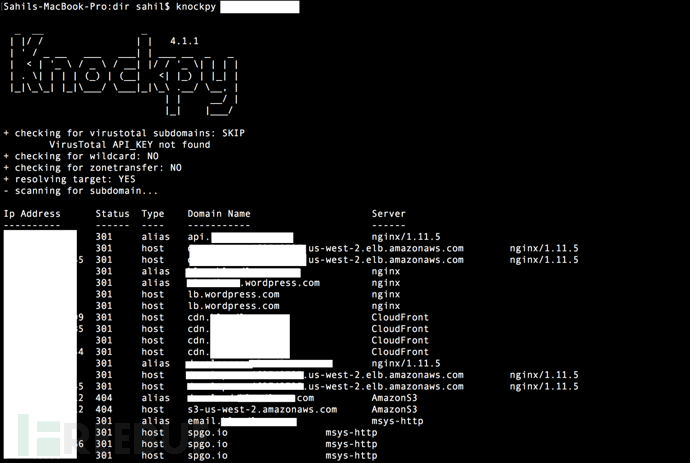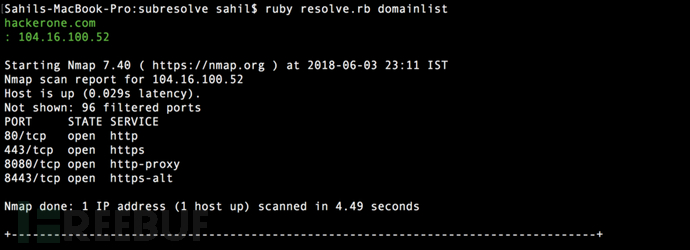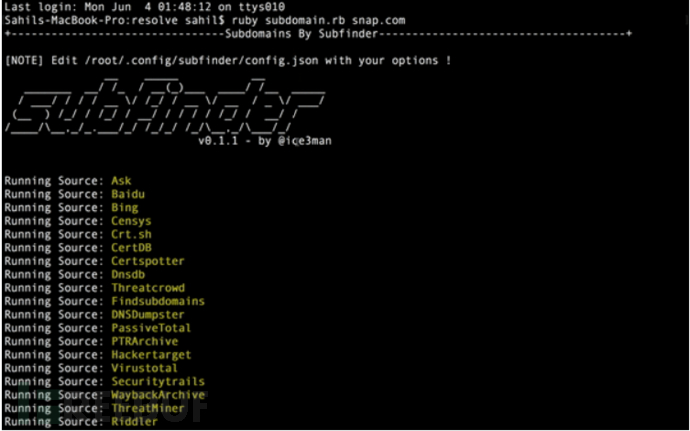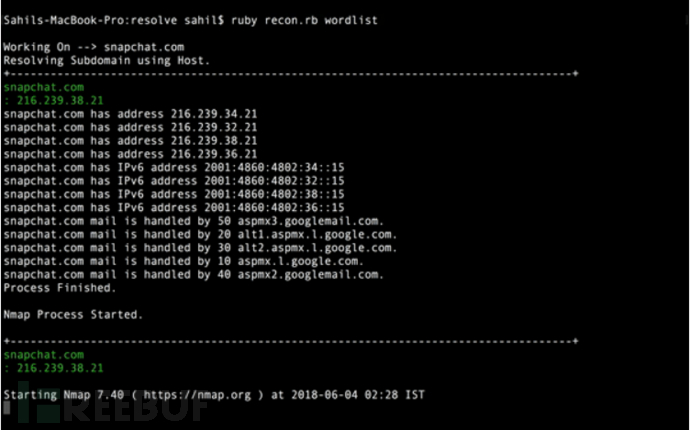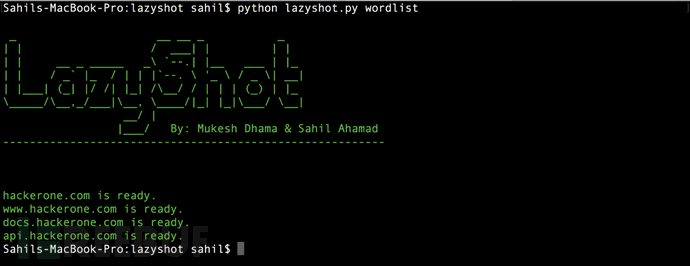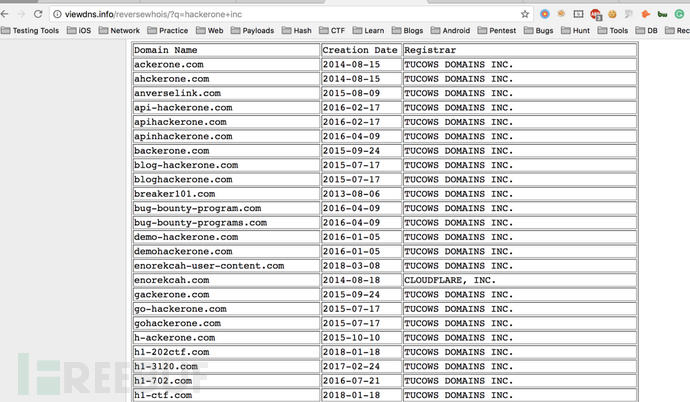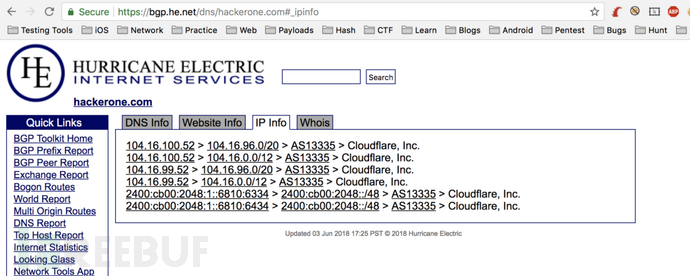Web应用安全测试前期情报收集方法与工具的介绍
作者:admin | 时间:2018-6-15 03:37:48 | 分类:黑客工具 隐藏侧边栏展开侧边栏
背景
这是一篇关于我在Web应用安全测试前期,进行情报收集的方法与使用工具的详细介绍文章。其实在很早之前,就有很多我的朋友以及社区成员要求我分享我的一些侦察经验。但我迷上了一部非常好看的电视剧,因此一直都没有时间。最近,我又收到了InfoSec社区的一些新成员的请求,这也促使我决定去写这篇文章。本文除了会介绍一些侦察的方法外,还会包含一些非常实用的侦察工具和服务。这些工具和服务在测试期间都给予了我很大的帮助,相信掌握这些工具和服务的使用,必定也会给你带来帮助。

简介
每当我收到一个新程序或者我想测试一个目标时,我首先会使用的工具就是Knockpy。
之所以选择使用它,是因为他可以为我提供一个带有响应码的子域快速浏览。
有一次,我在2分钟内就发现了一个子域接管错误。
knockpy可以说是我的幸运神器,迄今为止在HackerOne上knockpy已帮助我发现了近150个的bug。通过knockpy我很快就看到了一个指向AWS S3 bucket的404页面,并且bucket可用于创建。因此,我毫不犹豫的创建了新的AWS S3 bucket,并用编码的文件名上传了一个文本文件。在成功测试后,我第一时间报告了错误,在短短的15分钟内我就得到了赏金。
工具定制
我使用自定义的工具进行子域侦察。
我使用了Malvinsh的解析工具并定制了它。
https://github.com/melvinsh/subresolve
Malvinsh工具正在做两个非常简单的过程。
使用HOST从wordlist获取域/子域的IP地址。
执行Nmap扫描。
使用它的逻辑,我创建了两个脚本。
Subdomain.rb
Recon.rb
警告:请勿在未经允许的程序和目标范围使用这些脚本。
Subdomain.rb
Subdomain.rb是一个轻量级脚本,用于自动化的子域查找,而且它非常灵活 – 你可以轻松的为其添加其它工具。
Subfinder和sublist3r的结果有时会重叠,因此通常我会单独运行他们,实验证明这样做的效果非常好 - 这就是为什么我在这个脚本中保存了这两种工具的原因。
该脚本正在使用以下工具来获取子域数据。
subdomain.rb gist
使用:
ruby subdomain.rb domain.com我通常会创建一个文件,并将以上的输出的子域添加到文件中。然后,使用sort命令从文件中删除所有重复的子域。
sort wordlist | uniq我将最后一个唯一的子域文件传递给recon.rb
Resolve.rb
Recon.rb是另一个轻量级脚本,它也很灵活,同样可以你可以为其添加其它工具。工具被包含在recon.rb中
Host : 解析子域
Nmap : 执行对子域的端口扫描
AWS CLI – 在AWS CLI使用的脚本中,测试子域连接到AWS bucket或不检查列表权限。(可以自定义以测试写入权限文件。)
Dirsearch – 搜索默认字典列表和所有(*)扩展名的目录。
https://github.com/maurosoria/dirsearch
recon.rb gist
使用:
ruby recon.sh wordlistLazyrecon
https://github.com/nahamsec/lazyrecon
博客文章
https://blog.it-securityguard.com/bugbounty-decoding-a-%F0%9F%98%B1-00000-htpasswd-bounty/
https://en.internetwache.org/scanning-the-alexa-top-1m-for-ds-store-files-12-03-2018/
Visual Recon(可视化侦察)
我使用之前从subdomain.rb生成的wordlist进行可视化侦察。
我通常使用以下两个工具。
https://github.com/maaaaz/webscreenshot
https://github.com/mdhama/lazyshot
博客文章
https://blog.it-securityguard.com/visual-recon-a-beginners-guide/
获取更多的信息
当我对某个特定程序报告2-3个问题后,我会提交报告并等待厂商的回应。如果这个程序足够吸引我,那么我会继续尝试使用以下服务收集尽可能多的关于目标的信息。
Censys
-Commands 443.https.tls.certificate.parsed.extensions.subject_alt_name.dns_names:domain.com
“hackme.tld” + internal
“hackme.tld” + sandbox
“hackme.tld” + Staging
“hackme.tld” + Development/Dev
“hackme.tld” + production/prod
hackme inc Credit: @nahamsec
Interesting posts: https://0xpatrik.com/censys-guide/Censys工具:
https://github.com/yamakira/censys-enumeration
Shodan
Basics Filters: 1. City
Example City:New Delhi. 2. Country Example: Country:INDIA 3. Port Example:Ports: 8443, 8080, 8180 etc 4. OS (Operating System) Example: microsoft-iis os:"windows 2003" 5. Geo Example: apache geo:42.9693,-74.1224 6. Hostname Example: hostname:domain.com 7. After and Before Example: apache before:1/01/2014 8. Org Example: Org: Hackerone Inc. 9. Product Example: Product: Tomcat 10. Title Example: Title: “Dashboard [Jenkins]”
Taken from: https://www.exploit-db.com/docs/english/33859-searching-shodan-for-fun-and-profit.pdfViewDNS — 反向Whois查找。
使用whois命令获取目标的whois信息或使用任何其它在线工具获取。
whois domain.com如果该公司未使用域隐私服务,
你将能找到host-masters的电子邮件地址,然后你使用该电子邮件通过反向Whois来查找在同一电子邮件地址上注册的其他域。目标合法注册名称也可以使用。
AltDNS
https://github.com/infosec-au/altdns
Nmap Subdomain finding
#Finding subdomains via Nmap. nmap --script dns-brute --script-args dns-brute.domain=domain.com,dns-brute.threads=6,dns-brute.hostlist=./sub1000.lst
nmap --script dns-brute --script-args dns-brute.domain=domain.com,dns-brute.threads=6,dns-brute.hostlist=./sub10000.lst
nmap --script dns-brute --script-args dns-brute.domain=domain.com,dns-brute.threads=6,dns-brute.hostlist=./sub100000.lst
nmap --script dns-brute --script-args dns-brute.domain=domain.com,dns-brute.threads=6,dns-brute.hostlist=./sub1000000.lst #Wordlist : 1. sub1000.lst - https://drive.google.com/open?id=0B0h-Dh0Oss1zOGFqVVl1bTVpdWc 2. sub10000.lst - https://drive.google.com/open?id=0B0h-Dh0Oss1zTTdmQnZsQ0JCYzA 3. sub100000.lst - https://drive.google.com/open?id=0B0h-Dh0Oss1zdDBFT1dCc08ya0U 4. sub1000000.lst - https://drive.google.com/open?id=0B0h-Dh0Oss1zODNfSG1sbVJ1WE0 In case above links are not available : https://github.com/ehsahil/wordlists-for-nmap #Taken from http://blog.x1622.com/2016/11/subdomain-discovery-with-nmap-and.htmlContent-Security-Policy (CSP)
工具
使用Burp Suite发现目标,视频演示:
Burp Suite链接目标发现:
1. 关闭被动扫描
2. 设置表单自动提交
3. 将范围设置为advanced control并使用目标名称字符串(不是正常的FQDN)
4. 遍历+浏览,然后递归地复制所有主机!
5. 更多的目标!
Domain Analyzer
https://github.com/eldraco/domain_analyzer
Domain Profiler
https://github.com/jpf/domain-profiler
VHost Scan
https://github.com/codingo/VHostScan
ThreatCrowd
Visual Site Mapper
http://www.visualsitemapper.com/
证书透明度
Google透明度报告
https://transparencyreport.google.com/https/certificates
Certsspotter
https://certspotter.com/api/v0/certs?domain=hackerone.com
CertDB
Crt.sh —
https://crt.sh/?q=%25domain.com
Facebook证书透明度监控订阅。
https://developers.facebook.com/tools/ct
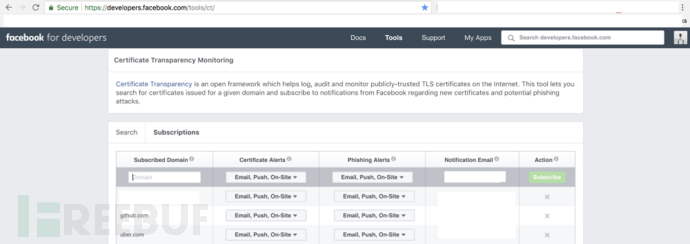
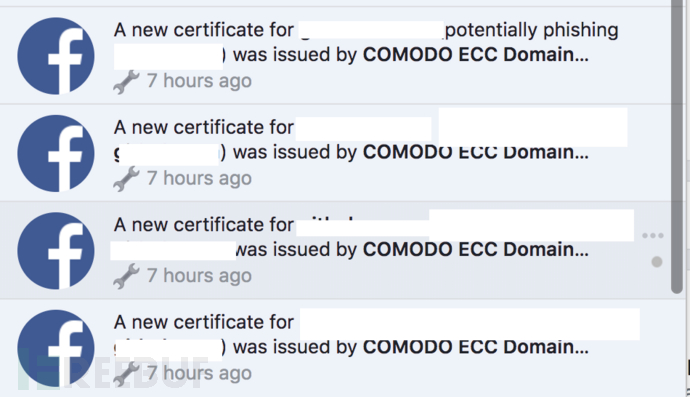
博客文章和工具
https://0xpatrik.com/asset-discovery/
https://0xpatrik.com/subdomain-takeover/
https://0xpatrik.com/takeover-proofs/
https://0xpatrik.com/project-sonar-guide/
侦察技术PDF文档
https://speakerdeck.com/yamakira/practical-recon-techniques-for-bug-hunters-and-pentesters
https://github.com/EdOverflow/can-i-take-over-xyz
数据存储Buckets
数据存储buckets通常所处位置。
Github
Javascript files
CSP Headers
Archive crawl
Pastebin
提示:如果bucket返回访问被拒绝的信息。那么请尝试在Google上搜索它。该团队很有可能最近更改了bucket的权限,并且特定文件已被Google编入索引(具有读取权限)。
如果应用程序具有文件上传功能,则尝试捕获文件上传请求并查看文件上传的位置。有时你可能会发现AWS或其他数据存储buckets,这是其他方法无法找到的。
如果你找到像upload-usercontent-target-prod这样的存储bucket,请尝试将prod更改为dev,staging,sandbox等。
AWS CLI — AWS CLI可用于验证或测试AWS S3 buckets权限,创建存储Buckets以及读取其他存储Buckets数据。AWS帐户需要使用CLI。
1. Listing AWS bucket content. (Testing for list permission)
Sahils-MacBook-Pro:~ sahil$ aws s3 ls s3://bucket 2. Writing on AWS Bucket. (Testing for write Permission)
Sahils-MacBook-Pro:~ sahil$ aws s3 cp test.txt s3://bucket (Copying test.txt into the bucket with no public file read permission)
Sahils-MacBook-Pro:~ sahil$ aws s3 mv test.txt s3://bucket (Moving test.txt into the bucket with no public file read permission)
Copy test.txt file into the aws s3 bucket with public file read permission.
Sahils-MacBook-Pro:~ sahil$ aws s3 cp test.txt s3://bucket --grants read=uri=http://acs.amazonaws.com/groups/global/AllUsers
Sometimes the bucket are only available in a particular region. For that use the following regions with `--region` flag. 1. US East (N. Virginia) - us-east-1 2. US East (Ohio) - us-east-2 3. US West (N. California) - us-west-1 4. US West (Oregon) - us-west-2 5. Canada (Central) - ca-central-1 6. Asia Pacific (Mumbai) - ap-south-1 7. Asia Pacific (Seoul) - ap-northeast-2 8. Asia Pacific (Osaka-Local) *** - ap-northeast-3 9. Asia Pacific (Singapore) - ap-southeast-1 10. Asia Pacific (Sydney) - ap-southeast-2 11. Asia Pacific (Tokyo) - ap-northeast-1 12. China (Beijing) - cn-north-1 13. China (Ningxia) - cn-northwest-1 14. EU (Frankfurt) - eu-central-1 15. EU (Ireland) - eu-west-1 16. EU (London) - eu-west-2 17. EU (Paris) - eu-west-3 18. South America (São Paulo) - sa-east-1
Example:
Sahils-MacBook-Pro:~ sahil$ aws s3 ls s3://bucket --region us-east-2 3. Deleting files from the bucket.
Sahils-MacBook-Pro:~ sahil$ aws s3 rm s3://bucket/test.txt
Reference : https://docs.aws.amazon.com/general/latest/gr/rande.html Bucket Finder – 一款非常好用的使用子域wordlist查找buckets的工具,可以把他集成到recon.rb脚本中。
https://digi.ninja/projects/bucket_finder.php
LazyS3 – LazyS3是另一款我经常用来查找staging, sandboxed, dev和生产buckets的工具。
https://github.com/nahamsec/lazys3
Slurp:一款优秀的AWS Buckets Recon工具。
https://github.com/bbb31/slurp
S3 Bucket Finder – 同样适用于AWS S3 buckets的工具。
https://github.com/gwen001/s3-buckets-finder
博客文章
侦察Github
Github对于查找目标的敏感信息非常有帮助。在公共GitHub存储库中可以找到访问密钥,密码,开放式端点,s3 buckets,备份文件等。
“Hackme.tld” API_key
“Hackme.tld” secret_key
“Hackme.tld” aws_key
“Hackme.tld” Password
“Hackme.tld” FTP
“Hackme.tld” login
“Hackme.tld” github_token
“Hackme.tld” http:// & https:// “Hackme.tld” amazonaws
“Hackme.tld” digitaloceanspaces
“Hackme.tld” storage.googleapis.com
“Hackme.tld” access_token
“Hackme.tld” blob.core.windows.net
“Hackme.tld” token
“Hackme.tld” secret
“Hackme.tld” TODO
“Hackme.tld” vulnerable
“Hackme.tld” CSRF
“Hackme.tld” Hash
“Hackme.tld” random
“Hackme.tld” HMAC
“Hackme.tld” MD5, SHA-1, SHA-2, etc.
credits @edoverflow & @nahamsec.博客文章
https://edoverflow.com//2017/github-for-bugbountyhunters
仔细查看每个JS文件
有时,Javascript文件中会包含一些敏感信息,例如各种密钥或硬编码令牌。
我在Javascript中找到了以下内容:
AWS或其他服务访问密钥
AWS S3 buckets或其他具有读/写权限的数据存储buckets。
打开备份sql数据库端点
开放内部服务端点。
工具
我通常喜欢在JSBeautifier的帮助下手动阅读JavaScript代码。
以下工具很有用:
LinkFinder
https://github.com/GerbenJavado/LinkFinder
JSParser – Behrouz Sadeghipour开发的另一款类似工具。
https://github.com/nahamsec/JSParser
博客文章
https://medium.com/bugbountywriteup/bug-bounty-tips-tricks-js-javascript-files-bdde412ea49d
存档
在waybackmachine中搜索目标网页,可以找到以下内容:
旧的和被弃用的JS文件。
旧API端点。
被弃用的CDN端点。
被弃用的子域名。
源代码注释中提供的Dev&staging端点信息 。
如果页面返回403,你也可以在way back machine搜索目标那些403页面,你会发现一些有用的信息。
工具:Waybackurl
持续侦察
在持续侦察中最重要的是处理未来使用的侦察数据,为此,我在SecurityEscape中创建了一个名为Swiftness的工具。我使用Swiftness来保存每个目标的所有侦察数据,并设置任务提醒来定期对目标进行重访调查(每个月)。
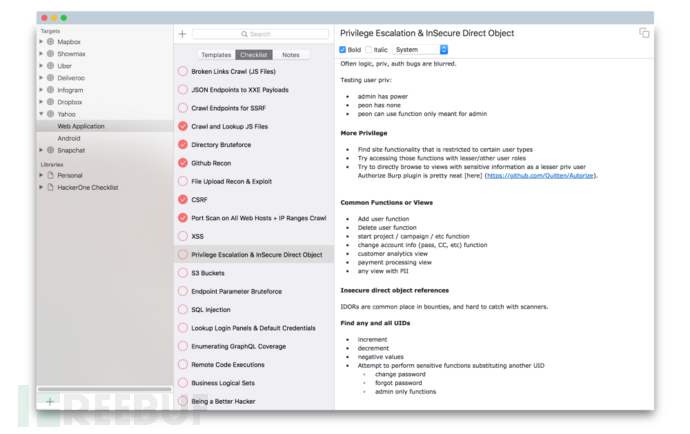
个人的一些小建议总结:
关注twitter上的一些安全动态以及安全工程师或安全公司的推特
阅读尽可能多相关的技术博文
以正常用户身份使用目标公司服务(如果可以)
阅读Github上commits和public issues对话
浏览robots.txt文件
熟悉公司DEV栈并尽可能使用它们
在YouTube或其他平台上观看目标公司的视频,包括新产品、演示、会议等
在Pastebin和trello等平台上搜索目标信息
使用搜索引擎dork搜索swf, txt, xml等文件
*参考来源:medium,FB小编 secist 编译
